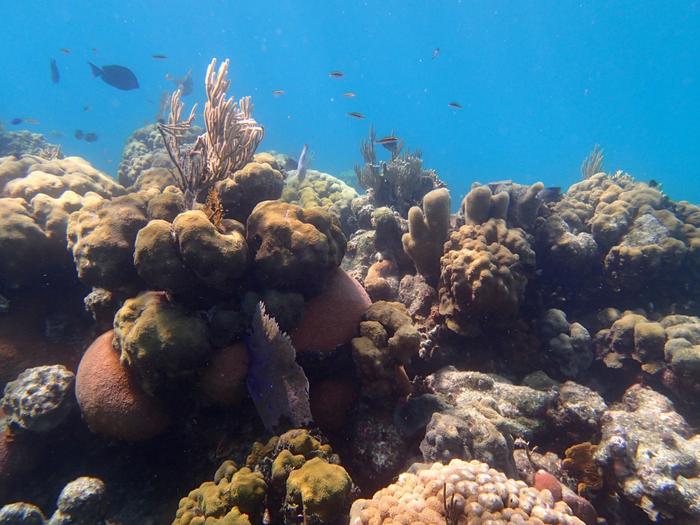DURHAM, N.C. – Scientists have created a research framework to incorporate ecological theory – mathematical models and concepts to understand interactions and dynamics of ecosystems – into ecosystem management and planning to more effectively scale restoration and counter rising carbon dioxide emissions globally.

Credit: Brian Silliman, Duke University
DURHAM, N.C. – Scientists have created a research framework to incorporate ecological theory – mathematical models and concepts to understand interactions and dynamics of ecosystems – into ecosystem management and planning to more effectively scale restoration and counter rising carbon dioxide emissions globally.
From coral reefs to forests, restoration helps damaged natural areas return to a healthy state able to support plant and animal life. Effective restoration helps protect wildlife, provides clean water and air, fights climate change, prevents flooding, supports recreation and the economy, and makes the environment more resilient to changes, including fires and floods.
But it hasn’t been a quick fix. “Global declines in natural habitats due to human activities far outpace ecosystem gains due to conservation successes,” said Brian Silliman, marine conservation biologist and director of a Duke University initiative to rebuild habitats such as coastlines and grasslands, Duke RESTORE, as well as the university’s Wetland and Coasts Center.
“The world is looking to ecosystem restoration to help address this gap,” Silliman said. Ecosystem restoration aims to help damaged or destroyed natural areas recover by reintroducing native plants and animals, improving soil and water conditions, and involving local communities to create healthy, self-sustaining environments.
“Unfortunately, most restoration efforts underperform,” said Silliman. “More effectively harnessing ecological theory in ecosystem restoration designs will go a long way towards making restoration a more viable conservation strategy.”
Silliman led a team of 23 scientists working across six countries to create a conceptual framework that maps ecological theories to desired restoration outcomes, published in Current Biology on May 6, 2024.
“Incorporating ecological theory into restoration practice can reduce costs to repair ecosystems, prioritize climate-smart restoration, and help rebuild ecosystems faster,” said Brian Silliman. “Nature is more predictable than we realize, so why not harness that power?”
For example, food-web theory and field tests of the idea, have shown that predators are key to plant life in almost all ecosystems, as predators protect regrowing plants from hungry herbivores. However, less than 10% of plant ecosystem restoration efforts incorporate predators into their designs.
“Ecological theories grounded in decades of testing and evidence are underutilized in restoration”, said Carter Smith, a Duke University lecturing fellow and scientist with Duke RESTORE. “Theories are abstract and often hard to understand if you are not a subject matter expert. We hope our analysis and guidance will help practitioners identify which theories are most relevant for their project goals.”
The scientists created a nine-step flow chart to implement a restoration project, starting with identifying the ecosystem/species and finishing with evaluation. This approach links desired outcomes, from taxonomy-specific to system-wide outcomes, to relevant ecological theories. The researchers outlined 10 ecological theories as essential, but underutilized, in restoration efforts. While these theories share common themes, they differ in focus and methodologies.
For example, facilitation cascade theory suggests that helpful interactions can create a chain reaction benefiting multiple species in a recovering ecosystem, while threshold theory looks at how recovered ecosystems react to changes or disturbances, emphasizing that small changes can sometimes lead to big, sudden shifts. Biogeography and macroecology theory outlines how physical factors shape where species live now and helps predict where they will live in the future, critical information restoration practitioners need to select which species to replant based on changing climates. Biodiversity-ecosystem functioning theory examines how the variety of life in an ecosystem affects how well it works, like its productivity and ability to sequester and store carbon.
National Science Foundation (NSF) and Friends of the Carolinas supported the research. NSF support comes from a 2023 grant it awarded Duke University and partner institutions to create an innovation hub in coastal North Carolina using ecosystem technology.
CITATIONS: “Harnessing ecological theory to enhance ecosystem restoration” Brian R. Silliman, Marc J.S. Hensel, Jean P. Gibert, Pedro Daleo, Carter S. Smith, Daniel J. Wieczynski, Christine Angelini, Avery B. Paxton, Alyssa M. Adler, Y. Stacy Zhang, Andrew H. Altieri, Todd M. Palmer, Holly P. Jones, Rachel K. Gittman, John N. Griffin, Mary I. O’Connor, Johan van de Koppel, John R. Poulsen, Max Rietkerk, Qiang He, Mark D. Bertness, Tjisse van der Heide, and Stephanie R. Valdez. Current Biology, May 6, 2024. DOI: 10.1016/j.cub.2024.03.043
Journal
Current Biology
Method of Research
Systematic review
Subject of Research
Not applicable
Article Title
Harnessing ecological theory to enhance ecosystem restoration
Article Publication Date
6-May-2024



